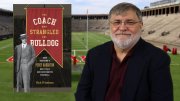Jacob Roberts ’19, who co-produced and starred in the film Rent Free, was profiled in the January-February issue of Harvard Magazine. Here, Roberts shares more about his creative inspirations, his time at Harvard, and how he spends his time outside of filmmaking.
Who is your acting or directing inspiration?
“Elaine May. I want to make serious comedies, and May’s The Heartbreak Kid (the original, not the Farrelly brothers remake!) proves that the best comedic premise also illuminates something essential about being human. Lenny Cantrow woos and weds the perfect woman, then immediately decides he’s made a mistake. He meets and pursues his new dream girl—while on his honeymoon. Aren’t we all a little like poor, pathetic Lenny? Furiously pursuing what we think we want only to find that, once we’ve got it, it’s not half as satisfying as we’d imagined. So it’s on to the next goal. We’ve always got to be chasing something. May doesn’t sprinkle jokes into a drama or take a comedy and add a few serious scenes. The humor and pathos are the inseparable products of the premise.”
What was your favorite course at Harvard?
“Louis Menand’s High and Low in Postwar America.’ This course on art and ideas in the Cold War bucked academia’s insistence on departmental silos. It was an interdisciplinarian’s dream. We studied Rauschenberg, Judd, and Piper alongside Sartre, de Beauvoir, and Fanon. Baldwin and Ellison alongside Elvis. I loved it.”
What has been your favorite day job?
“Veterinary assistant. I restrained the animals so they wouldn’t bite the doctor. (They bit me instead.) I also cleaned up excreta. The practice was on the Upper East Side, and I scooped feces for Marty Scorsese’s terriers and Drew Barrymore’s labrador retriever. When will I ever again get that close to dogs that famous?”
Can you share a notable memory from on set?
“I was directing a short called Waterfront Property, and it was a more complex project than I’d ever taken on with a lot of talented people I hadn’t worked with before. So I was very anxious to make a good impression. It’s late September. Upstate New York. The very first shot of the very first day was in a lake. Long story short, I gave my lead, Chloe Claudel ’19, low-grade hypothermia. There is no more efficient way to lose the respect of your cast and crew than to almost freeze someone to death immediately after rolling camera. (She was okay.)”
What’s a misunderstanding about Gen Z?
“I was born in January 1997, so I don’t feel like I belong to either Generation Z or the Millennial Generation. I guess I’m a Zillennial. It’s a cusp micro-generation. (Yuck.) You know what, for the sake of this question, let’s just say I’m Gen Z.
One misconception is that we’re the generation whose brains have been rotted by too much screentime. Don’t get me wrong—my brain is indeed rotten. But the smartphone has also lobotomized my Baby Boomer parents. (Kidding, Dad!) Technology doesn’t discriminate based on age. If you can figure out how to use a touchscreen, you’re a goner.”









